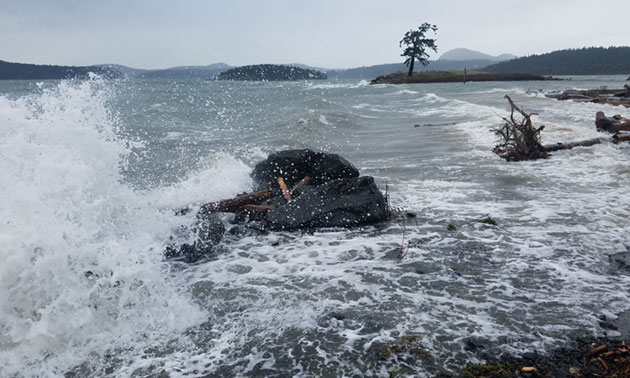 |
| High tide during a storm event at Lone Tree Point. Photo credit: S. Grossman |
As greenhouse gas emissions continue to rise, impacts from climate change and ocean acidification are altering habitat conditions for marine species and threaten to reduce fisheries productivity. Calcifying organisms are especially vulnerable to ocean acidification which makes it harder to build and maintain shells.
In the Swinomish Climate Adaptation Action Plan, the community identified several climate-related impacts as a high priority of concern that affects cultural identity and food security, including: increasing inundation of tidelands due to sea level rise, weakened viability due to habitat changes, and potential loss of harvest sites and opportunities due to impacts to shellfish populations and habitat. Therefore, to ensure future generations have access to healthy shellfish resources, the Shellfish Program incorporates climate change and its associated effects in all of our projects.
We also specifically address climate change impacts and adaptation measures in a number of targeted research projects and technical products.
Research projects
- Since 2015, our team has been restoring Olympia oyster habitat around the Reservation to increase the abundance of Washington’s only native oyster and promote resiliency in the nearshore environment (see Olympia oyster restoration)
- In 2016, we conducted a field experiment to assess the effectiveness of two potential climate adaptation strategies, the presence of macrophytes and addition of shell hash, on the local carbonate chemistry and juvenile clam recruitment, survival and growth.
- To better understand how global greenhouse gas emissions and local human impacts are affecting shellfish habitat, we have been increasing our capacity to monitor specific water properties through various projects and the installation of a monitoring buoy (see environmental data).
- Sea level rise has the potential to dramatically reshape shorelines in the Pacific Northwest, yet these changes are not likely to uniformly impact all habitat settings. We are in the process of conducting a study to examine how sea-level rise may impact clam habitats across the western shore of the Reservation in order to identify the most vulnerable beaches and also the areas with highest potential for long-term resilience.
- Our clam garden project is also a climate adaptation strategy that directly addresses a suite of community concerns identified in the SITC Climate Adaptation Action Plan (link to clam garden tab).
Technical products
- In collaboration with the Skagit River System Cooperative, we completed a report, Climate vulnerability assessment for habitat and associated fisheries in the inland waters of northern Washington State, that examined how climate change might impact habitat conditions for tribally-important fish and shellfish.
- Staff are currently completing a shellfish-specific update to the Tribe’s Climate Adaptation Plan titled Climate Change Adaptation Strategies for Shellfisheries. The report identifies strategies and actions to reduce the impacts of climate change and ocean acidification on tribally-important shellfish resources.
Links
- Swinomish Climate Change website: swinomish-climate.com/fisheries
- Swinomish Publications: swinomish-nsn.gov/resources/publications
Funders: SITC, Bureau of Indian Affairs Rights Protection Implementation, Climate Change Program and Tribal Climate Resilience Program, U.S. Environmental Protection Agency (PA-00J322-01, PA-00J99101, PA-01J76801, RD-83559501), Washington Sea Grant (NA19OAR4170387, NA18OAR4170095, NA18OAR4170095 16), National Oceanic and Atmospheric Administration (NA21NMF4270364), Northwest Climate Adaptation Science Center FY21 Grant, U.S. Fish and Wildlife Service Tribal Wildlife Grants (F14AP00495), Conservation, Research and Education Opportunities International, PADI Foundation